In 2015, Moses Lake School District (MLSD) began working with Cardea, in light of apprehension among the school board, parents, and community members about implementation of sexual health education. MLSD officially joined WA PREP in 2016. As the district was preparing to move forward with WA PREP, Kristi Hoffheins stepped in as the Executive Director of Learning and Curriculum, and Kristi has been a wonderful champion for sexual health education ever since.
WA PREP staff worked collaboratively with Kristi on a school board presentation with data on sexual health education and information about WA PREP.. WA PREP Training Manager, Kathy Silverman, supported Kristi in preparing for meetings with parents and community members to answer questions about sexual health education. As MLSD navigated what Kristi called “the journey of sexual health for Moses Lake School District,” she noted, “They [WA PREP] were understanding of the conservative nature of our community and were solution-oriented and collaborative in how best to approach this within our district.”
Curriculum Selection and Professional Learning
Based on its work with WA PREP, MLSD decided to offer sexual health education in grades 5-8 and launched a curriculum selection process. The district chose Draw the Line/Respect the Line, a curriculum that focuses on abstinence and generalizable refusal skills, to address parents and community members’ interest in supporting young people with learning how to set healthy boundaries related to their sexual health and in all aspects of their lives.
Once the school board granted approval of the curriculum, Kristi supported faculty and staff in receiving training on core skills for sexual health education and on the curriculum. She indicated that WA PREP’s comprehensive approach to, not only curriculum training, but developing teachers’ comfort and confidence in foundational core skills was important for faculty and staff. In addition, WA PREP included guidance on teaching sexual health in a way that respects a variety of values and reinforces parents’ role as the primary sexual health educators of their children.
Capacity Development and Sustainability
MLSD continues to be an active WA PREP partner, sustaining sexual health education by training new teachers, as needed. Kristi commented, “It's very important to identify staff who are comfortable and passionate about helping students understand information as it relates to their sexual health. Also, as staff turnover occurs, the training for most effectively teaching such material is critical.” Teachers are supported by WA PREP staff through opportunities for ongoing professional learning and capacity development. The district also administers pre/post student surveys to assess students’ understanding of sexual health content before and after participating in the curriculum. Data from the national PREP program indicate that “The majority (75%) of youth perceived the PREP program better prepared them for adulthood, noting improvements in their healthy relationship skills, healthy life skills, and parent-child communication skills.”
MLSD is committed to updating its sexual health education to ensure alignment with Senate Bill 5395. WA PREP celebrates Kristi’s leadership and the district’s success and looks forward to continuing to support MLSD in promoting the health and well-being of students through comprehensive sexual health education.
The Teach Back — Inspiration and Information from the Field — Quincy School District
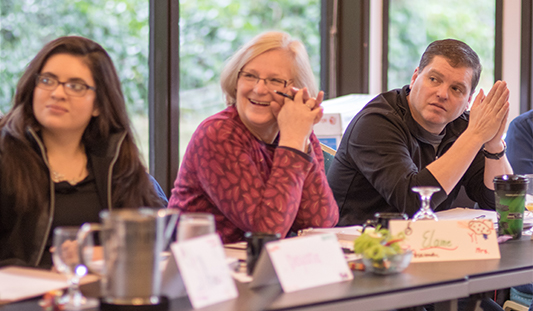
There are few sex ed champions who match the vigor and commitment of Carole Carlton. Two years ago, Carole applied for WA PREP as the Director of Student Achievement for Quincy School District. She had a vision of updating the sexual health curriculum in grades 5 to 12. Today, Quincy is accomplishing that vision with the adoption of three evidence-based curricula at the elementary, middle, and high school (including alternative high school) levels. The Quincy Community Health Center also adapted an evidence-based curriculum for use with young adults and parents they serve. The synthesis of these efforts is part of what makes Quincy one of our star partners.
Choosing a Curriculum
At our initial site visit with Quincy, we had our biggest attendance yet with 23 participants, including principals, teachers, public health educators, community clinic promotoras, and staff from the superintendent’s office. It was evident from the start that Carole and the leads from Grant County Health and Quincy Community Health wanted sexual health education to be a community- and school district-wide effort. We talked about the program, reviewed the curriculum options that would reach as many students as possible, and committed to working together as a community to improve teen health.
After consulting with the publisher ETR Associates and DOH’s federal project officer, we decided to shift the curriculum, Draw the Line|Respect the Line (DTL/RTL) from grades 6- 8 to grades 5-7. DTL/RTL focuses on abstinence and generalizable refusal skills, which made it a good fit for this community. DTL/RTL is also appropriate for Latino youth, making it a good choice for this community. For 8th grade and the high school, Quincy chose FLASH, both of which were recently revised and updated by Public Health—Seattle & King County. FLASH is currently being evaluated as an evidence-based intervention (EBI) and has been approved for use in WA PREP. One of the advantages of FLASH is that family homework is available in several languages. In addition, FLASH is unique in that its authors gave particular focus to research-driven activities aimed to reduce sexual violence, in addition to reducing teen pregnancy and HIV/STDs. A Quincy School Board member and parent of a student in High School FLASH wrote to their child’s teacher:
I know that teaching sex ed honestly and thoroughly to students is very challenging and nerve-wracking, but I really appreciate your commitment to doing so, from both a parent and board member perspective. The board fully supports teaching students what they need to know to keep them healthy and safe, both physically and emotionally. You are obviously committed to doing this, and I am grateful for your efforts.
Implementation
Since there was some apprehension about sex ed, Carole worked hard to assure teachers that she and the district supported them. She also collaborated with representatives from the community health center on standard messaging for all parents. Before a parent meeting held at the health center, about 30 families served by the health center planned to opt out of having their students participate. After talking with parents at the meeting, and showing them the lessons to be taught, none of these families opted out. The vast majority of students in grades 5-9 is now receiving sexual health education. Because so many teachers have received training in Quincy, Cardea committed to two fidelity monitoring visits, one focused on elementary and middle school and another focused on high school. After observing four teachers, it was evident that they were teaching lessons as they were written, with respect and care for their students’ well-being and attention to cultural appropriateness.
Sustainability
After two years as a WA PREP partner, Quincy is still going strong! A year after our first meeting, Quincy committed to sending more people to be trained – teachers, a community health center promotora and manager, and two Grant County public health educators. The health educators can now provide backup for when PREP teachers are out sick. They can also co-teach or guest-teach lessons. The promotoras focused on ¡Cuidate!, a curriculum specifically designed to help Latino youth develop the knowledge, attitudes, and skills to reduce their risk for HIV. Quincy is committed to widespread training, so there are several people ready to go in case of retirements or job changes. This is a key factor supporting the sustainability of WA PREP.
Quincy also implemented a novel approach to an all-district parent sex ed night. They planned a nighttime event where parents could cycle through 3 of 4 stations. Stations covered the curriculum at the elementary, middle, and high school levels, with an additional station specifically for parents whose primary language is Mixtec or Spanish, with interpreters present. The event was well-received, and very few families opted out of instruction after attending.
Quincy has also served as a model for other Central and Eastern Washington districts. Carole has graciously connected with colleagues to explain the program, how they handled controversies, and how they addressed challenges through community partnerships. Cardea truly appreciates the opportunity to work with Carole and the entire WA PREP team in Quincy.
The Teach Back — Inspiration and Information from the Field
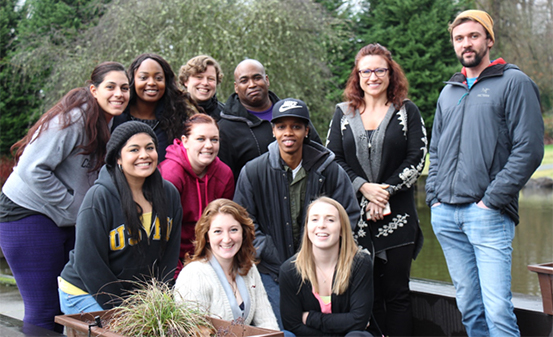
Boys & Girls Clubs Washington State Association joined WA PREP in 2014, starting out with five sites, and adding four more in 2015. Today, almost 20 trained facilitators continue to teach sex education to young people at these sites. While teaching sex education, they build on existing skills, such as keeping youth engaged, ensuring sessions are interactive, providing special incentives to support recruitment and retention, and creating a safe space for youth. Washington Clubs facilitators are experts at making learning fun, as we have witnessed during training and at fidelity monitoring visits!
Through the training and technical assistance they receive from WA PREP, facilitators grow into a role that is a professional development opportunity for many, and aligns with the mission of their Clubs… To enable all young people, especially those who need us most, to realize their full potential as productive, responsible, caring citizens. To date, Washington Clubs have served nearly 500 youth through WA PREP. Facilitators have said:
WA PREP is totally in line with our mission that they have a positive safe place to be, including a safe place to ask questions and get information.
We prepare our members for careers and academics, etc. With WA PREP we now also prepare participants for healthy relationships and for when they’re ready to be sexually active.
Choosing a Curriculum
Most sites chose Making Proud Choices targeting younger teens and ideal for smaller groups in after-school settings. Two clubs added Be Proud! Be Responsible! to their repertoire when they expanded to include older youth. Each facilitator then attended a three-day training that provides an opportunity for new WA PREP facilitators to build comfort and confidence in the core skills of sexual health education, as well as learning about the EBI and practice teaching lessons.
Implementation
Washington Clubs use a variety of implementation models, often alternating models to fit the time of year and schedule. Most clubs do at least one overnight a year. Typically, youth arrive after school on Friday, and instruction continues through Saturday. Facilitators have reported that overnights are most successful when there are plenty of staff to help out, and when modules are alternated with fun activities and other types of breaks to help mix things up and keep the energy high. MPC and BPBR both feature the repetition and practice needed to integrate new skills, including role plays. This can be a facilitation challenge when implementing several modules in one day. Staff have found that applying creative twists to later modules can help the content feel fresh.
The South West King County (White Center) Branch regularly implements MPC with 5th-7th graders during summer camp weeks. After two modules a day in the mornings (Monday-Thursday), they celebrate completing the program with a pizza party on Friday. Seeing an opportunity to expand the program, Education Director Eileen Schuetz added implementing BPBR, in partnership with the Seattle Youth Violence Prevention Initiative.
The Sequim and Port Angeles Clubs collaborate on most implementations. This arrangement allows for more youth to attend given varied schedules and more regular access to implementations. The relationship between the two clubs also enables staff to support each other, plan together, and share resources. We have seen similar benefits among other peer collaboration sites.
Sites like the Washington Clubs in which special programming is optional and youth have complex schedules, also face challenges in recruiting and retaining youth for WA PREP. To address this challenge, Clubs have been creative about incentives, including ending with field trips. With overnight implementations, the event itself is also an incentive, as youth enjoy the special opportunity.
Sustainability
Across all sites, leadership support is a crucial factor for program sustainability and success. Over the last three years, Matt Watrous has played an important leadership role. Matt works with the Cardea team to coordinate club efforts, help administrators trouble shoot implementation issues, and serves as a champion for club accomplishments. The involvement of leadership at each club is also crucial for scheduling, planning for staff time, and allocating resources to the project. According to a Club director:
WA PREP puts our organization in an arena that our community doesn’t necessarily see us in. People often see us as this drop-in rec center. WA PREP supports us being seen as a resource, having added WA PREP to the menu that we offer to kids.
This club is also using the story of their WA PREP work to secure diverse funding sources that will help sustain implementation.
A common challenge for many WA PREP sites is staff turnover. Leadership works proactively to get staff trained who tend to stay in their positions longer than other staff. Clubs immediately request training for new staff when a seasoned WA PREP facilitator leaves. Finally, some Clubs are beginning to work with an apprenticeship model to bring on new facilitators. At Olympic Peninsula Clubs, experienced staff assist with larger groups when they run WA PREP overnight camps to support their colleagues and minimize burn-out.
With the support of technical assistance from WA PREP trainers, based on the 8 key factors related to sustaining impacts from the Office of Adolescent Health, Washington Clubs continue to build their capacity to effectively leverage partnerships and resources to continue implementing sexual health education.
Youthnet's looking SHARP!
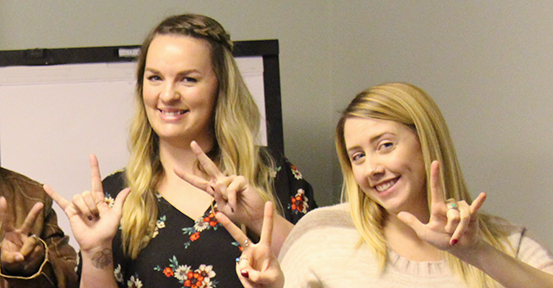
Youthnet works with youth in foster care in five Northwestern Washington counties and has been implementing WA PREP on a monthly basis. Sarah and Sara at Youthnet in Mt. Vernon are passionate about working with youth in foster care. Sara is a case manager in the Independent Living Skills program at Youthnet and WA PREP facilitator. While Sarah recently left Youthnet, we were excited to hear that she continues her commitment to working with youth in Seattle. And, they are fabulous!
Choosing a Curriculum
In Fall 2014, Cardea oriented Youthnet to WA PREP and guided them through the BDI logic model process to choose the evidence-based intervention (EBI) they felt would work best for the youth they serve. Staff chose SHARP for its focus on the impact of alcohol on sexual risk-taking and its relatively short duration (five hours).
In preparation for training, Cardea invited the two case managers Sarah and Sara to the WA PREP Sustainability Partner Summit in October, so they could hear about WA PREP implementation from peers, particularly Boys & Girls Clubs staff in their area who also implement WA PREP. At the Summit, they learned an array of strategies, tips, and tricks shared by experienced partners who had been teaching EBIs over the past few years. In December, they attended a four-day Adolescent Sexual Health/Training of Facilitators (ASH/TOF). ASH provides an opportunity for new WA PREP facilitators to build comfort and confidence in teaching sexual health, including instruction on birth control, gender and sexual diversity, and linkage to sexual health care services. The TOF provides an opportunity for new facilitators to learn about the EBI and practice teaching lessons and facilitation skills.
Implementation
After the ASH/TOF, Youthnet staff practiced teaching SHARP and communicated with foster youth and their families about WA PREP to ensure buy-in. They implemented with three groups of youth on Saturdays in April, May, June, and July, offering gift cards, free transportation, and free food and drink as incentives for participating in the five-hour classes. During the summer, they implemented on weekdays and weeknights, because many youth work weekends.
But, the real story here is the magic that happens in Sara and Sarah’s classroom where youth are supported and invited to share, so that they feel comfortable right from the start. Sara and Sarah frame their implementations with a cultural proficiency lens, using tools from ASH/TOF on how to adapt the EBIs to be more inclusive of all youth. In addition, they weave healthy relationship skills throughout implementation. In observing implementation, they clearly have close relationships with youth and demonstrate how much they care about these young people. They are truly sex ed superstars!
Sustainability
Youthnet plans to implement WA PREP on an ongoing basis with youth. Recently, Jason, a former WA PREP facilitator at Boys & Girls Club, transitioned into a new role at a Youthnet and continues to be involved as a WA PREP facilitator in Sarah’s place. Cardea continues to provide technical assistance on LGBT inclusion, incentive strategies, and how to share successes via Youthnet newsletters, their website, and youth word-of-mouth.
Green Hill School
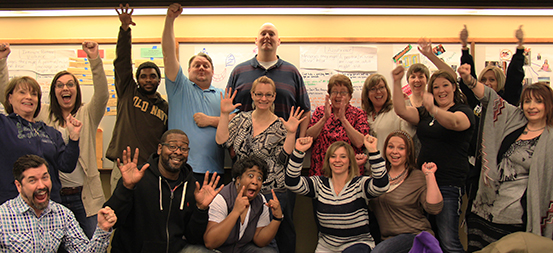
Choosing a Curriculum
After a memorandum of agreement (MOA) was signed and the program was piloted in the summer, work with four RA sites began in September 2013. Cardea engaged key staff from all four RA sites during an all-day site visit. Green Hill School (GHS) sent six staff to the site visit because of its large population and the potential for several groups of young people to benefit from WA PREP. Staff demonstrated flexibility right from the start as they began to learn about WA PREP and their new role. Cardea oriented staff to the project and guided them through the BDI logic model process to choose the evidence-based intervention (EBI) they felt would work best for the youth they serve. GHS chose Be Proud! Be Responsible! (BPBR) and Making Proud Choices (MPC). The facilitators trained in both curricula, but eventually decided to implement only MPC, believing that GHS youth would benefit from the longer curriculum targeting a developmentally younger age group.
Although staff were excited to participate in WA PREP, they had no previous training on delivering sexuality education and were somewhat nervous about their new role. To address this concern, Cardea met with the RA’s WA PREP liaison to discuss the possibility of providing Adolescent Sexual Health (ASH) training, in addition to EBI training, to increase comfort, confidence, and knowledge around sexuality education. GHS sent all six staff to a 2.5-day ASH training, as well as a three-day training for the chosen EBIs (MPC and BPBR).
Staff were very engaged in the trainings and enjoyed learning about key components of adolescent sexuality. Cardea particularly focused on how to create a safe environment to support youth in learning about pregnancy and STI prevention. Staff left the trainings feeling enthusiastic and ready to start! One staff person said in her evaluation:
“Our confidence levels are higher than we could have ever hoped, and we are all pumped and ready to teach our youth.”
Implementation
GHS administration supported the newly created WA PREP team as they met to plan implementation, including scheduling class dates and times, selecting youth to participate, and finding classroom space. Any hesitations that staff may have had were alleviated by full support from GHS administration, as well as the RA WA PREP liaison.
The GHS team expressed gratitude for the support they received:
"Once again, thank you all for providing us with the opportunity to teach such an invaluable lesson that will hopefully allow our youth to make better decisions for not only themselves, but their peers, families, and communities. STDs, HIV/AIDs, and teen pregnancy are an increasing problem in our country and risky behaviors are on the rise, especially within the teenage population. With increased knowledge and awareness, we believe our youth will have a better chance meeting their goals and becoming healthy, productive members of society by giving them the strength, courage, and ability to MAKE PROUD CHOICES!"
The first implementation cycle began in January 2014 with two cohorts; one group met on Thursday and Friday afternoons, and another group met on Saturday mornings. The weekday group opted for shorter classes, because of the attention span of the youth in their groups. Facilitators gained more comfort and confidence with every lesson taught. The young men were very engaged and eager to learn more about sexual and reproductive health, showing a particular interest in STI/HIV prevention. The enthusiasm of both facilitators and youth, combined with a commitment to sustaining WA PREP over time, resulted in RA administration providing a small stipend to create a great WA PREP classroom with new books and posters, as well as space to store teaching supplies.
In February 2014, Cardea conducted an initial fidelity visit to GHS to ensure that the EBI was being implemented as designed and to provide feedback and support to the facilitators. GHS staff led a wonderful tour of the facility, and Cardea had an opportunity to meet with a GHS program manager. The GHS staff’s commitment and passion for their work were evident as they shared information about GHS’ mission and programs.
Support from GHS administration continued throughout the first implementation, and the relationship between RA administration, GHS staff, and WA PREP developed via regular email and phone communication. A GHS program manager who was not involved directly in teaching shared:
“You all are doing great work, and I am hearing from the residents how impactful your work is in helping them identify positive options in keeping themselves healthy and building their self-esteem.”
The RA WA PREP liaison worked with Cardea’s evaluators to create a system to track the four RA sites’ compliance with deliverables, with respect for youth confidentiality and integrity of the process.
Sustainability
GHS remains excited about its role as a WA PREP partner and continues to implement classes. Staff transition has been an ongoing challenge, and GHS has managed those transitions well. Two new facilitators from the GHS Intensive Management Unit were trained in the SHARP curriculum in February 2015. One new facilitator was also trained in MPC in May 2015. These new facilitators will be very helpful in sustaining WA PREP efforts at GHS.
One of the facilitators shared some of the impact WA PREP has had on changing GHS policy. Inspired by what they learned from WA PREP, some of the youth at GHS wrote two proposals that ultimately led to increased access to HIV testing and HPV vaccines on site. She also heard from previous PREP participants who returned to GHS after being out for a period of time that they had practiced safe sex even when they were under the influence of alcohol or drugs. All of these successes, in addition to facilitators inviting management and other staff to attend trainings, has led to an institution-wide commitment to WA PREP sustainability. They are happy to report that the “entire Hill is seeing its value.”
Columbia High School
How did Columbia High School become a WA PREP partner?
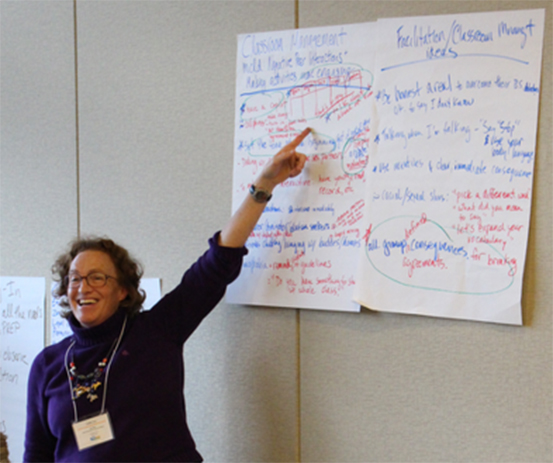
Application
Caitlin applied to the WA PREP program in Fall 2011 because of her concern about the increase in teen pregnancy rates in White Salmon. As part of the process of applying to the program, she shared data and her concerns with the superintendent, principal, and assistant principal and enlisted their support. Securing leadership buy-in early on was key to Columbia High School (CHS) being a leader amongst our intervention partners in planning for sustainability. Simply put, sustainability means our partners continue to teach young people long after the first year of WA PREP services.
Choosing a Curriculum
In February, 2012, CHS became a WA PREP Intervention Partner and Cardea completed a needs assessment tool with CHS staff to assess the technical assistance and training needs for support and delivery of the evidence-based intervention (EBI). The March site visit focused on developing a behavior-determinant-intervention (BDI) logic model with clearly defined health goals and behaviors that informed CHS’s choice of Reducing the Risk (RTR) for implementation beginning in May.
Implementation
Caitlin implemented RTR in the required 9th grade Health and Fitness class. Over its three-year involvement with WA PREP, CHS has reached over 150 youth. Although she was the only trained facilitator, she was able to recruit the class instructor to help teach the 16-lesson curriculum. RTR combines experiential activities to build skills in refusal, negotiation, and communication. In addition, the instructor assigned a reflection paper at the end of the program, asking the students to reflect on their experience with RTR. Student comments about why they liked RTR include:
- Role plays were fun
- I learned a lot more about HIV and STIs
- Friendly teacher and knowledgeable
- We got to take a field trip to the health center and they answered some of our questions
- Knowing how many methods are available to prevent pregnancy and infections
- Knowing how to say, “No”, sticking with my decisions and examples on how to say “No” effectively
Sustainability
Cardea presented RTR evaluation data from youth surveys and to Caitlin to help ensure continued buy-in from the school board. The board was extremely impressed with the evaluation data and encouraged Caitlin to continue her work.
Positive outcomes of the RTR curriculum being integrated into the 9th grade health and fitness class included:
- Youth learned refusal skills to prevent pregnancy and STIs/HIV that are transferrable to other risk behaviors like drugs and alcohol.
- RTR is an intensive program, so there are plenty of opportunities for youth to practice skills.
- The use of an anonymous questions box has been effective in providing information on adolescent sexuality that teens really want.
- Youth go on a field trip to a local clinic to help them feel more comfortable about accessing services. During the visit, they learn how to communicate.
- Adults observing youth share what they have learned from RTR with other students outside class and in the hallways, i.e., dispelling myths and empowering each other with the correct knowledge about sexual health.
Due to personnel changes, Caitlin has had some challenges with having a consistent group of trained co-facilitators and with finding time to schedule RTR in all the freshman health classes. Despite these challenges, she continues to implement WA PREP with success.
Importantly, WA PREP has influenced other programs at CHS. Caitlin runs Girls Circle, a structured support group model that “integrates relational theory, resiliency practices, and skills training in a specific format designed to increase positive connection, personal and collective strengths, and competence in girls.” She feels that the facilitation skills she gained from implementing RTR have increased her skills and confidence in running Girls Circle. In addition, CHS has a Theater Troupe. Most of the teens in this Troupe participated in RTR and bring the communication and decision-making skills from RTR to enhance their work with the Troupe as they work together on productions.
Based, in part, on CHS’ exemplary work on WA PREP and its demonstrated commitment to sexual health education, the Office of Superintendent of Public Instruction (OSPI) approached White Salmon school district to partner on the CDC-funded Exemplary Sexual Health Education (ESHE) program, allowing them to continue to work on prevention of HIV, STD and teen pregnancy prevention; safe and supportive environments for all students and staff; access for adolescents to key sexual health services in the community; and policies related to these focus areas.
